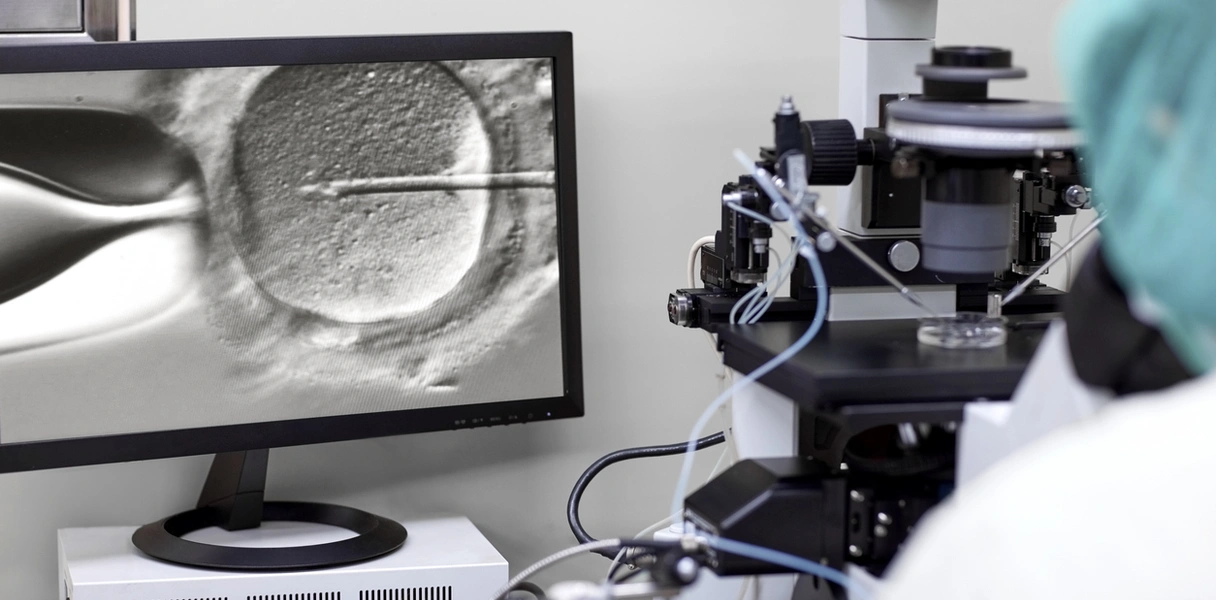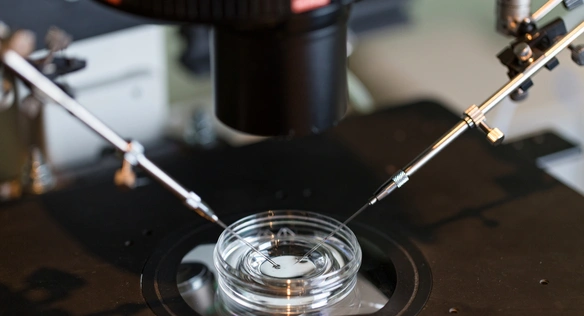The patient receives hormonal medication to stimulate the development of several follicles. Ultrasound and hormonal monitoring are carried out over about 10–12 days.
ICSI - Intracytoplasmic Sperm Injection
Intracytoplasmic Sperm Injection in Madrid

ICSI (Intracytoplasmic Sperm Injection) is an in vitro fertilization technique indicated in cases of severe male infertility or when there have been previous fertilization failures. It involves injecting a sperm cell directly into the egg to facilitate fertilization. At Fertility Madrid, we carry out this procedure in Madrid with the highest technological precision and a team of reproductive medicine experts, thereby increasing the chances of achieving pregnancy.
When is ICSI recommended?

- Low sperm concentration or motility (oligozoospermia, asthenozoospermia).
- Abnormal sperm morphology.
- Previous failures in conventional IVF.
- Use of frozen sperm or testicular biopsy sperm.
- Compromised fertility due to medical treatments (chemotherapy, vasectomy, etc.).
What is the ICSI process like?
Controlled ovarian stimulation
Puncture and oocyte retrieval
When the follicles reach the optimal size, ovarian puncture is scheduled under sedation.
Processing of the semen sample
The laboratory selects the most viable sperm, whether from a fresh, frozen, or biopsied sample.
Sperm microinjection (ICSI)
A single sperm is introduced into each mature egg through micromanipulation in the laboratory.
Embryo culture in a GERI incubator
The embryos develop in stable, controlled, and monitored conditions thanks to the GERI time-lapse system, which avoids the need to open the incubator constantly.
Embryo transfer
Between day 3 and 5 after fertilisation, the best-quality embryo is transferred to the uterus.
Advantages of ICSI
- High fertilisation rate even with few sperm.
- Effective solution for severe male infertility.
- Possibility of using frozen sperm or sperm from testicular biopsy.
- Compatible with Preimplantation Genetic Testing (PGT-A/PGT-M).
- Overall improvement of results in in vitro fertilisation cycles.
ICSI at Fertility Madrid
You will find us in the heart of Madrid (C/ General Oraá, 47), with easy access by public transport and nearby parking facilities.
Do you have doubts about whether ICSI is right for you?
Contact our team to schedule a free first consultation with no obligation. We will guide you according to your case, answer all your questions, and design the most suitable treatment.Frequently asked questions about ICSI
Does ICSI guarantee pregnancy?
No. Although it improves fertilisation, the final success depends on the quality of the eggs, sperm, and embryo.
How much does an ICSI treatment cost in Madrid?
El precio puede variar según cada caso. Contacta con nosotros y te daremos un presupuesto personalizado.
Can ICSI be done with frozen sperm?
Yes. It can even be done with sperm obtained through testicular biopsy.
How does ICSI differ from conventional IVF?
In ICSI, the embryologist selects a single sperm and introduces it directly into the egg, which increases the chances of fertilisation in cases of male factor infertility or previous failed fertilisations.
When is ICSI recommended?
Mainly in cases of low sperm count or quality, motility problems, obstructive azoospermia, use of frozen sperm, or fertilisation failures with conventional IVF.
Is ICSI painful for the patient?
No, because the microinjection is performed in the laboratory and the follicular puncture to retrieve the eggs is carried out under sedation.
How long does the complete ICSI process take?
Including ovarian stimulation, puncture, and embryo transfer, the cycle usually lasts between 15 and 20 days.
Are there risks associated with ICSI?
The risks are similar to those of conventional IVF, such as ovarian hyperstimulation syndrome or multiple pregnancy. At the embryonic level, the technique is safe and does not increase the risk of malformations.
Can ICSI be used for same-sex couples or single women?
Yes, as long as the treatment is carried out with donor sperm and in compliance with current Spanish legislation.
